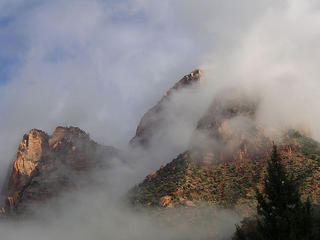Tucson Weekly: Images from the Battleground
Check out Leo W. Banks' article in the Tucson Weekly, "Images From the Battleground"
Whoa, Whoa! Illegals and Smugglers jamming signals? Paranoid delusions right? Maybe not-
Read it all.
At 11:30 a.m. on April 22 this year, a Mexican helicopter landed in the Robinsons' backyard. Arivaca resident R.D. Ayers had driven to the ranch that morning to visit his injured dog, then under Dr. Robinson's care.
Ayers describes stepping outside the house to see what he describes as 'a military Huey-type helicopter' circling, at the same time that a truck from the Tucson Fuel Co. was pulling into the yard. The Tres Bellotas gets its power from diesel generators, and that fuel has to be delivered.
As he approached the chopper, Ayers says six men in black, commando-type uniforms stepped out. Five had ski-type masks over their faces, and they wore body armor and carried automatic rifles. On their sleeves, Ayers saw the word, Mexico.
They stood in a defensive posture around a sixth man, their leader, who identified himself as a member of the Mexican police. He pointed aggressively to the fuel truck and asked what it was doing there. Ayers, in Spanish, told the man he was in the United States, not Mexico, and that he had no business in this country and needed to leave.
But the commander refused to listen and began walking toward the truck, at which point Ayers placed himself between the commander and the truck, again telling him to scram. After a few minutes, the tense confrontation ended when the commander ordered his troops into the chopper, and they split back across the border.
Ayers suspects that the Mexicans--one of Robinson's cowboys identified them as federales, Mexican federal police--were escorting a drug shipment to Tucson, and wanted to haul it in the fuel truck. Or they wanted to steal the fuel. The chopper had followed the truck much of the way down Tres Bellotas Road.
"Men with fully automatic weapons and masks don't just show up to say hello," says a still-outraged Ayers, owner of a backhoe company and a former EMT in Arivaca. He added that if he'd had his gun, he might've fired on the invaders. "I wasn't going to back down. This is my country."
These drug incursions occur with some regularity along the border. The Kays and Robinson say they're personally aware of three such incursions this summer alone, and it's worth noting that the men who recently shot two Border Patrol agents near Nogales also wore black, commando-type gear.
But this episode, like the others, has disappeared into the vapor of national security. Tucson Fuel refuses comment. The Border Patrol won't talk about it, saying its agents got to the Tres Bellotas too late to learn much of anything. The FBI in Tucson took a report the same day and forwarded it to Washington, but they're not talking, either.
As for Robinson, he was gone from the ranch that day, holding a veterinary clinic on the Tohono O'Odham Reservation--ironically enough, under a contract from the Department of Homeland Security. "I really don't know what happened," he says. "But I know my cowboys were so scared, they hid in the barn."
The driver of the fuel truck arrived at Tom and Dena Kay's ranch, eight miles north of the Robinson place, between noon and 1 p.m. that day.
"He was still shaken up, really wild-eyed," says Dena, who put in the first call to the Border Patrol. Ayers had tried to call, but when he got atop Black Mesa, the only place in the immediate area where cell phones work, the call wouldn't go through. He suspects that smugglers had jammed the signal.
Whoa, Whoa! Illegals and Smugglers jamming signals? Paranoid delusions right? Maybe not-
In addition to ratcheting up the stakes, the chopper incident did something else--it cut off Robinson's fuel supply. Tucson Fuel informed him that it would no longer deliver diesel to the ranch. Another company made one delivery and quit, citing the lousy condition of the road. The Border Patrol has helped by delivering fuel, and they've offered to provide an armed escort if Robinson can find a company willing to deliver. But Robinson hasn't decided what he'll do. He's thinking of buying a tanker to deliver his own fuel, and installing solar power. But that still won't give him phone service, except with his cell from atop Black Mesa, a 20-minute drive away.
Two years ago, he and Mollie got an expensive satellite phone and used it for several weeks, until all of their calls began mysteriously routing through a Mexican operator in Hermosillo. Even Verizon's technical people couldn't explain it.
Then a Border Patrol agent told the Robinsons what they already suspected: It's the smugglers again. They'd probably jammed the signals. The Kays say the same thing. At times of heavy night traffic on the Tres Bellotas, their cell phone--they have no land line--sometimes stops working for no apparent reason.
Read it all.


0 Comments:
Post a Comment
<< Home